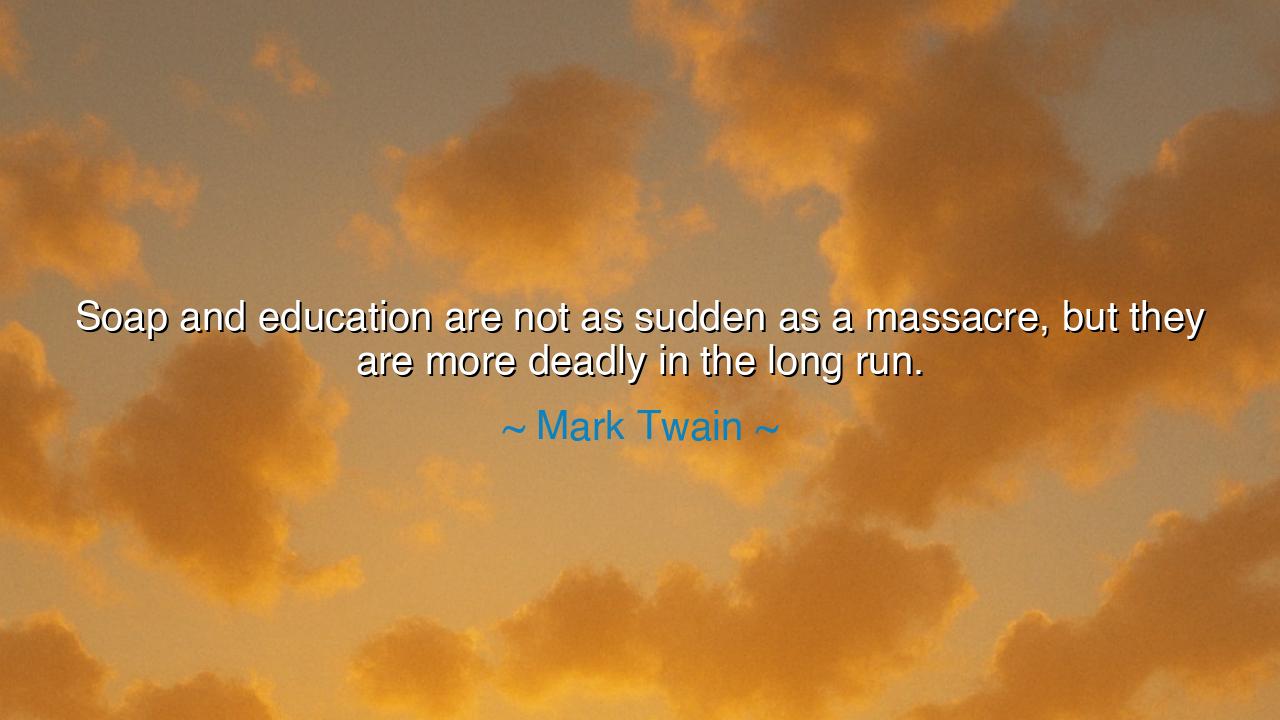
Soap and education are not as sudden as a massacre, but they are
Soap and education are not as sudden as a massacre, but they are more deadly in the long run.






"Soap and education are not as sudden as a massacre, but they are more deadly in the long run." — so spoke Mark Twain, that great observer of the human soul and its follies. These words rise not from cynicism, but from a vision that pierces the veil of civilization. They tell us that the tools of cleanliness and learning, though gentle and slow, carry within them a quiet power that can transform — or destroy — entire ways of life. For while a massacre takes lives in a moment, soap and education can erase whole cultures, beliefs, and identities over generations.
In the old days, conquest was waged with the sword, and blood ran freely across the earth. Kingdoms fell in days, and temples burned before the setting of the sun. Yet what the sword could not finish, education and civilization could. They came with smiles, books, and promises of progress. The conqueror’s hand, once red with blood, now held a pen — and with that pen, he rewrote the stories of those he had conquered. The body may heal from the wound of steel, but the soul does not so easily recover from the cleansing of its memory.
Consider the story of the Native American nations. The arrival of the white man brought both soap and schoolhouses. Children were taken from their homes and placed in institutions where they were taught that their language was shameful, their gods false, their ways savage. “Kill the Indian, save the man,” said the reformers. And though they did not slaughter them by the thousands with muskets, they murdered their identity, their songs, and their spirits with words, discipline, and hymns. Thus, the massacre continued — quiet, polite, and devastatingly thorough.
This is what Twain saw: that civilization, in its hunger to spread itself, may cleanse so deeply that it erases the very essence of those it touches. The soap that washes the skin may also wash away the markings of heritage. The education that enlightens one mind may darken another’s memory of who they once were. And yet, both are praised as noble — for who could stand against cleanliness and knowledge? But therein lies their danger: their deadliness is hidden beneath benevolence.
Yet we must not despise education or progress themselves, for they are not evil. What Twain warns us of is the spirit of arrogance that often accompanies them — the belief that one’s way of life is superior, that others must be remade in our image. True education liberates; false education enslaves. True soap purifies; false soap erases. The wise must discern the difference and guard against the conquest that comes not with armies, but with ideas.
So, my children, let this be your lesson: when you teach, do so with humility. When you share your knowledge, do not force it upon others as the only light, lest you extinguish theirs. When you cleanse, remember what you are washing away. Every culture, every custom, is a flame — unique, sacred, and fragile. To smother it in the name of purity is a sin far greater than violence, for it kills not just bodies, but the spirit of a people.
And in your own life, seek both wisdom and compassion. Learn deeply, but never let your learning make you blind to the beauty of difference. Wash your hands, but not your soul. For the true purpose of education is not domination, but understanding; not to make others like us, but to make us better able to live among them. Remember Twain’s warning, and let your knowledge heal, not conquer. Thus, the world may be cleansed — not of its colors, but of its cruelty.






AAdministratorAdministrator
Welcome, honored guests. Please leave a comment, we will respond soon